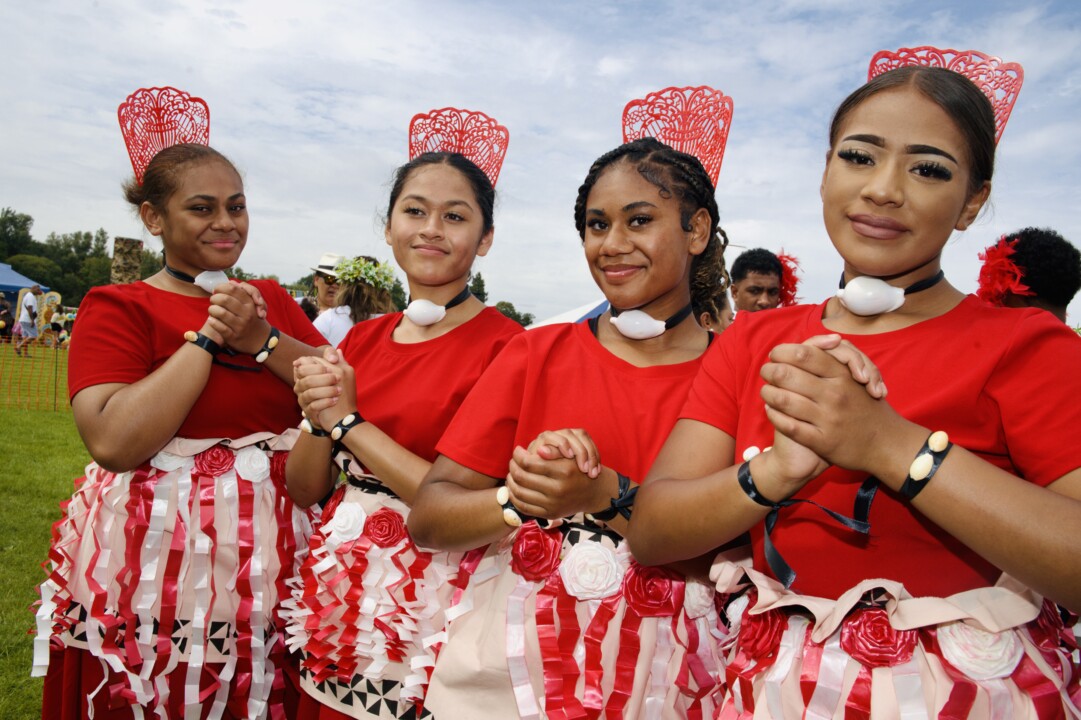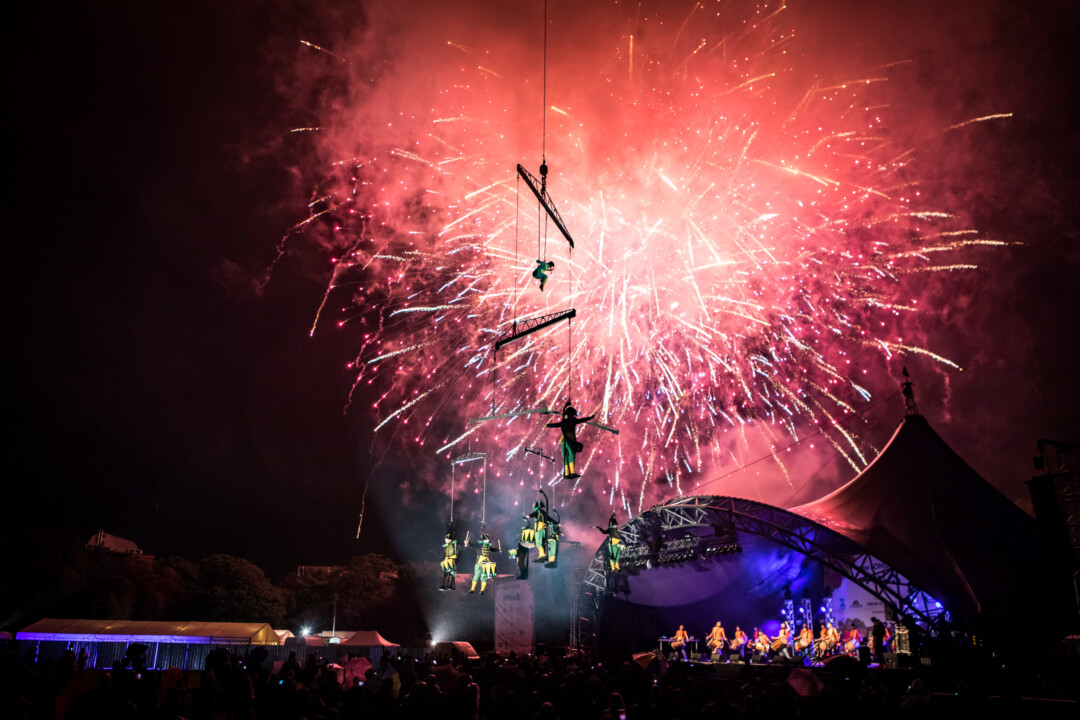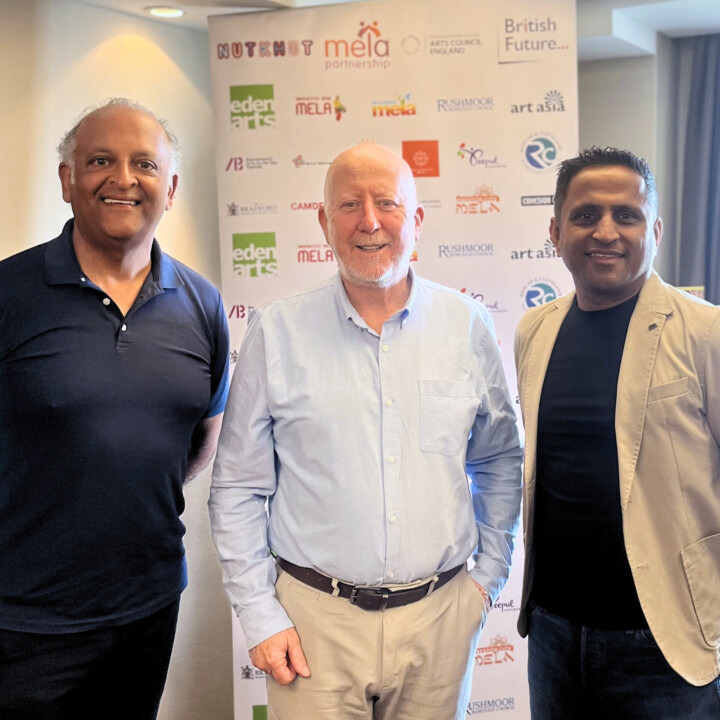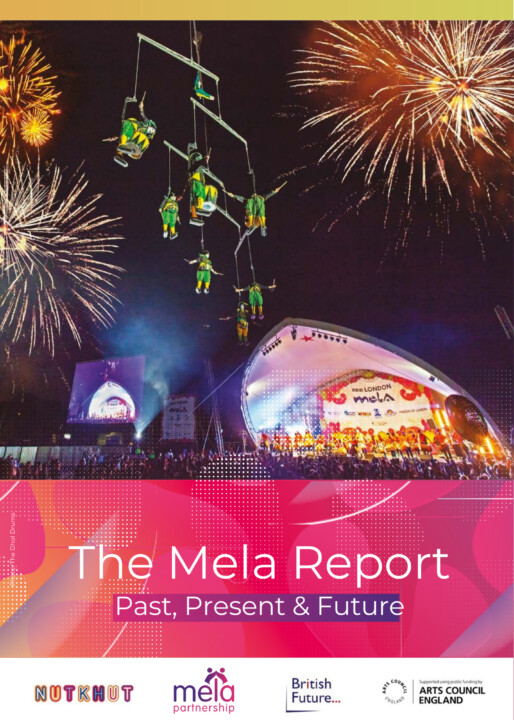
Harnessing the Power of Outdoor Arts to Foster Dialogue and Rebuild Communities
Growing up in the 1970s and 1980s I witnessed the harsh realities of violence and community strife, lessons that resonate deeply today as we confront a similar pattern of unrest across the country. The recent riots, particularly in Asian neighbourhoods, have not only revived those painful memories, the stories of our refugee parents, but also highlighted a stark truth. Speaking to a British Pakistan arts consultant, we agreed:
“In times of turmoil, we all become refugees, regardless of our backgrounds or identities. Ignorance can’t distinguish between shades of brown.”
Today, we stand at a crossroads where fear, division, and opportunity intersect.
As an arts champion and Mela advocate, I observed this summer’s riots unfold in towns and cities where many of our Mela Partners live and work, eliciting a sense of shock but no surprise. The simultaneous timing of these disturbances with Mela events poignantly highlights the underlying tensions in our communities. While some celebrations bravely continued, others were regrettably cancelled, reflecting the current climate’s challenges.
Inconsistencies in decision-making by authorities across the country further complicated the situation. Newcastle stood out by demonstrating effective leadership, showcasing how arts organisations, police and city leaders can work together to foster community resilience. This intersection of cultural expression and unrest emphasizes the urgent need for enhanced collaboration and support to navigate these turbulent times.
As co-founder of Nutkhut and a lifelong advocate for outdoor arts, I’ve seen first-hand how cultural initiatives like Mela can transform communities. Mela is not just a festival—it’s a celebration of unity, diversity, and resilience. In times of crisis, it becomes a vital tool for social dialogue. But are we fully harnessing its potential in these turbulent times?
Growing up in South East London & North Kent, during the 1970s and 1980s, I lived in a working-class community alongside white neighbours and Travellers. We shared the same schools, youth clubs, street markets, while our parents worked in factories and manual jobs. This wasn’t a community divided by fear but connected by common struggles.
Similarly, Simmy Gupta, Nutkhut co-founder, grew up in the politically charged Midlands where her family’s MP was Enoch Powell, infamous for his divisive “Rivers of Blood” speech. Despite the tension, Simmy’s experience reinforced the importance of solidarity within communities. Our personal histories shaped Nutkhut’s core values: unity, resilience, and a relentless focus on bringing people together—no matter their background.
The Soft Power of Culture in Action
Culture wields immense soft power—often underestimated but deeply impactful. The British Council reports that 75% of people globally believe cultural engagement improves their perception of the UK. Locally, the same is true: festivals like Mela don’t just entertain; they spark dialogue and understanding. A UNESCO study revealed cultural events are 14% more likely to foster intercultural dialogue than other forms of engagement. How, then, can we allow Mela to be side-lined, often underfunded, and first in line for cuts?
I’ve seen first-hand how last year’s launch of the Mela Report in Parliament has reshaped the thinking of decision-makers. The report has challenged policymakers to think beyond Mela as simply a cultural festival, recognising it as a vital platform for dialogue, community resilience, and inclusion. Its influence is evident in the broader approach now being taken toward arts funding and community strategy. It’s a step forward in integrating cultural expression into the heart of our civic life.
The distant protests in Aldershot this summer provided a stark backdrop to the Bula Festival. With Fijian roots and Indian heritage, I navigate this rich tapestry, aware of the complexities of public space and policy. The vibrant celebration of Fijian culture contrasted sharply with the unrest nearby, highlighting the fragile balance between unity and division in today’s world. Celebration and conflict coexist.
In 2021, with no prior warning, during covid lockdown, the London Mela, Europe’s largest Mela, faced abrupt funding cuts by the Greater London Authority. 21 years of Mela in London came to an end. Yet, despite these setbacks, Mela across the country remains crucial for fostering unity and understanding. But as leaders, we must ask: are we missing critical opportunities by continuing to underfund these spaces at a time when community cohesion is more vital than ever?

© Copyright Nutkhut - Mana Pasifika Dancers - Photo Credit Hayley Madden

Mobile Homme by Transe Express and Dhol Academy at London Mela Finale, produced by Nutkhut
Conversations That Shape Policy
Our advocacy for Mela is gaining recognition within government: Andy McDonald, MP for Middlesbrough & Thornaby, spoke in Parliament about Mela’s role in bringing communities together, especially in riot-affected areas. This was echoed by Rt Hon Yvette Cooper, the Home Secretary, who acknowledged Mela’s ability to foster resilience. These conversations led to Mela being formally recognised in a parliamentary debate, unlocking crucial funding for communities hit hardest by unrest.
Watch Andy McDonald’s speech in the House of Commons: Mela – Outdoor arts in PARLIAMENT
This is how grassroots movements evolve into national policy. Conversations, sparked by events like Mela, transform into strategies that help rebuild and restore fractured communities.
The ripple effect of engagement grows into lasting societal impact. Mela, as a space for creative expression and dialogue, plays an integral role in shaping these discussions. But are we doing enough to ensure that cultural diplomacy like this is woven into our national strategies for social cohesion?

Ajay Chhabra, Andy Macdonald MP, Kash Patel
Middlesbrough Mela: A Case Study in Cultural Diplomacy
The Middlesbrough Mela offers a powerful case study in how culture can lead to tangible, meaningful change. Amid unrest, the Mela became a platform for unity and trust. Through Nutkhut and the National Mela Partnership, we facilitated key meetings with leaders like Middlesbrough Mela Director Kash Patel, Andy McDonald MP, Mayor Chris Cooke, Senior Arts Executive Stella Hall and Police Crime Commissioner Matt Storey, forming a Mela Advisory Group to rebuild trust between the community, government and legal channels.
Watch now: Riots, Priorities, Mela – The RPM of Public Space (0.59 secs)
Research by Arts Council England shows communities with higher cultural engagement report 20% stronger feelings of social integration. The Middlesbrough Mela exemplifies how cultural events are not just moments of celebration, but mechanisms for rebuilding fractured relationships. This proves how soft power, when leveraged effectively, can create bridges between divided groups. But can we scale this model? Shouldn’t every community in crisis have access to this kind of cultural diplomacy?
Watch now: Mela Talks – Middlesbrough Reflections. (4 min 45 secs)
Leading the National Mela Partnership: A National Perspective
Our work at Nutkhut goes beyond individual Melas. Through the National Mela Partnership, we are building a nationwide network of festivals that advocate for Mela as an essential part of the UK’s cultural landscape. Cultural festivals like Mela significantly contribute to the economy—arts and culture generate £10.8 billion annually, according to the British Council. Yet, historically, Mela has been undervalued and underfunded.
We are changing that narrative. The National Mela Partnership provides leadership, advocacy, and support to ensure Melas across the UK get the recognition and resources they deserve. UNESCO’s Assistant Director-General for Culture, Dr. Ernesto Ottone Ramírez, rightly states:
“Cultural heritage and creativity are pillars of development.”
But are we, as leaders, truly leveraging Mela’s potential to address social fractures and influence policy change on a national scale?
Building for the Future
As Nutkhut and the National Mela Partnership continue our work, we reflect on the future. In an era of misinformation, division, and unrest, Mela’s role is more crucial than ever. It offers a platform for dialogue, creative expression, and rebuilding trust. Mela challenges both cyberspace and public space, creating opportunities for meaningful engagement where they are needed most.
This summer, we broke away from the echo chambers that so often dominate the arts. Instead of recycling the same conversations with the same people, we took deliberate action to invite new voices and fresh perspectives. It was a conscious decision to challenge the status quo, to disrupt the comfort of familiar faces around the table. The arts should be a catalyst for real change, not a space for stagnation. We asked ourselves, are we truly moving forward, or just treading water? This time, we chose to move forward.
In these uncertain times, the power of culture to bring people together is something we cannot afford to overlook.
The future of our communities depends on our willingness to champion these platforms of engagement. Let’s ensure that Mela, and the values it stands for, remain at the heart of our national conversation.
– Ajay Chhabra, Co-founder and Co-artistic Director of Nutkhut
Sign Up to the Outdoor Arts Newsletter
Sign up to the Outdoor Arts Newsletter, our advocacy piece for Outdoor Arts, where you’ll receive news, sector information, and updates about upcoming events, performances and festivals straight to your inbox.



